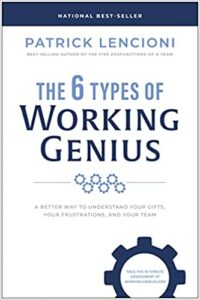6 Types of Working Genius by Patrick Lencioni
 When two friends whose organizational minds I trust (shout out to PH and EF!) recommend the same book in the same week, I take notice. Now I find people talking about it all over the place.
When two friends whose organizational minds I trust (shout out to PH and EF!) recommend the same book in the same week, I take notice. Now I find people talking about it all over the place.
6 Types of Working Genius is about the process of how work gets done, and how you fit in that process.
In typical Patrick Lencioni style, he begins with a fable (cf. The Five Dysfunctions of a Team), and that fable draws you into the big idea of the book.
There are six types of work that go into any kind of work getting done, from start to finish, Lencioni argues.
- Wonder
- Invention
- Discernment
- Galvanizing
- Enablement
- Tenacity
Yes, they conveniently fit into an acronym to aid memory: WIDGET. And as a Presbyterian, I love acronyms!
Before defining these ‘geniuses,’ let me build out two important frames. First, work moves through three stages: Ideation (Wonder & Invention) à Activation (Discernment & Galvanization) à Implementation (Enablement & Tenacity). Second, the first genius in each group (Wonder, Discernment, Enablement) is responsive, that is, it responds to some external stimulus or prompting. The second genius in each pairing (Invention, Galvanization, Tenacity) is proactive so it will initiate change by insertion into a process.
Here, then, are the six geniuses (or types of work):
Wonder: ‘the ability to ponder and speculate and question the state of things, asking the questions that provoke answers and action.’ This genius observes the world and asks questions like Why is this the way it is? How could this be better?
Invention: ‘coming up with new ideas and solutions.’ This genius loves to solve problems with creativity and ingenuity.
Discernment: is about ‘instinct, intuition, and uncanny judgment.’ This genius is able to read new situations, ideas, and people with gut feel and pattern recognition, and is able to give valuable advice, even outside of their areas of expertise.
Galvanizing: involves ‘rallying, motivating, and provoking people to take action around an idea or an initiative.’ This genius inspires and persuades others and recruits volunteers naturally.
Enablement: ‘providing people with support and assistance in the way that it is needed.’ This genius responds to the needs of others, helping them accomplish their goals and anticipating their needs.
Tenacity: is about ‘the satisfaction of pushing things across the finish line to completion.’ This genius loves to finish projects according to specification, overcome obstacles, and achieve closure.
Of those six types of work, Lencioni argues that we each have 2 Working Geniuses, 2 Working Frustrations, and 2 Working Competencies.
- Working Geniuses: areas of skill that give us joy, energy, and passion.
- Working Frustrations: though we might be able to complete work in these areas, they drain us of joy and sap our energy.
- Working Competencies: these activities bring us neither joy nor misery and we can operate here for a period with some success.
Once you figure out where you fit (there is an assessment available on the web), it’s fun to think about how you fit with others you work with, whether in your family system, the workplace, or ministry and group contexts. This exercise is called a Team Map and can give insight to how your team works together.
6 Types of Working Genius is not a be-all-end-all, but a helpful tool to understand your relationship to work and your team. It’s worth talking about.
